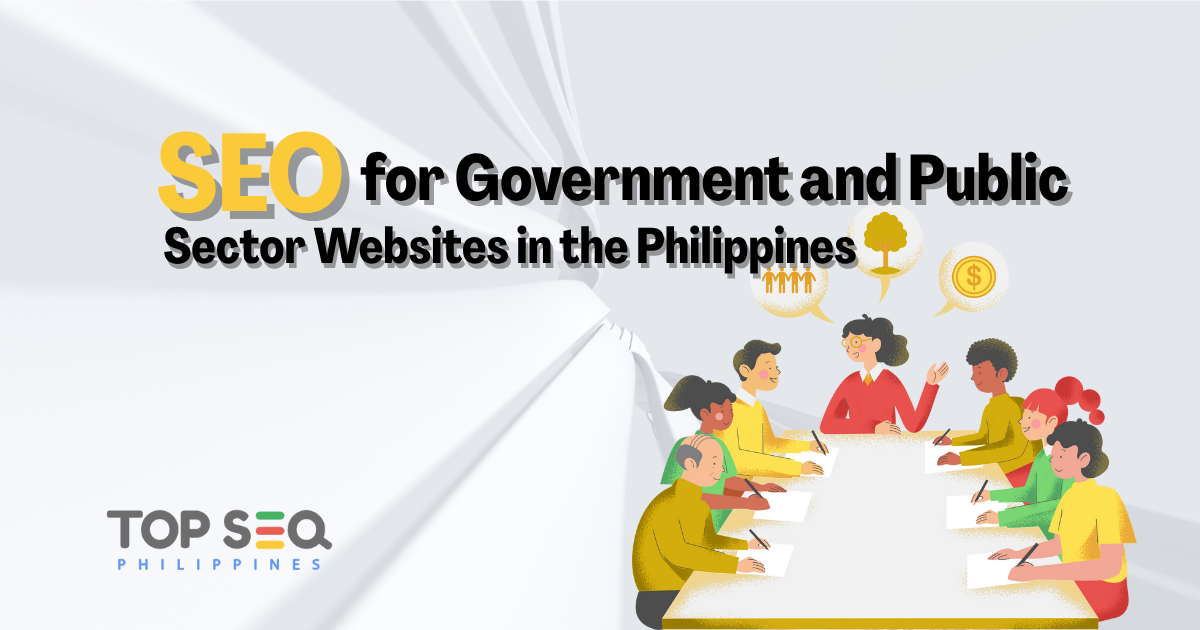Introduction
citizens expect government information to be accessible online from renewing IDs to checking public advisories. However, many government and public sector websites in the Philippines still struggle to appear on search results, making it difficult for people to find reliable information.
This is where an SEO Specialist becomes essential. With their expertise in optimizing websites for search engines and user experience, they help government agencies build trust, enhance transparency, and deliver efficient online services.
Let’s dive into how SEO applies to public sector websites, the challenges it faces, and how an SEO Specialist can bridge the gap between government services and Filipino citizens.
1. Why does it matters for Government and Public Sector Websites
Government websites serve as the digital gateway for citizens seeking essential information and services—such as social assistance, business registration, and health programs. If these websites are not optimized for search, they risk being buried under unrelated or outdated results.
An SEO Specialist ensures that when people search for “PhilHealth benefits,” “passport renewal,” or “government jobs in the Philippines,” they are directed to the correct and official source.
SEO for government websites is crucial because it:
- Promotes accessibility: Makes it easy for citizens to find accurate information.
- Strengthens transparency: High-ranking, regularly updated sites signal credibility and trust.
- Encourages engagement: Drives more citizens to use online services rather than offline processes.
- Reduces misinformation: Ensures official information outranks unreliable third-party content.
In short, it is not just about ranking it’s about building a trustworthy connection between the government and the public.
2. The Role of an SEO Specialist in the Public Sector
An Specialist plays a strategic role in ensuring that public sector websites are optimized for both users and search engines. Their approach differs from commercial SEO because the goals focus on public service rather than profit.
Here’s how an Specialist contributes to government digital success:
a. Conducting Technical SEO Audits
Before making changes, an Specialist reviews the website’s structure, speed, mobile-friendliness, and security. They fix technical issues like broken links, duplicate content, or slow-loading pages that can hurt user experience and rankings.
b. Optimizing On-Page Elements
From crafting keyword-optimized titles and meta descriptions to improving content readability, the specialist ensures every page is clear and accessible. Proper header tags, internal linking, and descriptive URLs also help citizens navigate information more easily.
c. Creating User-Focused Content
Government websites often use bureaucratic or technical language. An Specialist rewrites and structures content using simple, searchable phrases that align with how people actually look for information for example, “how to renew driver’s license online” instead of “LTO renewal procedure.”
d. Implementing Local SEO
For regional offices or city departments, local SEO is vital. An Specialist ensures that searches like “DSWD office in Cebu” or “Quezon City tax payment portal” return accurate, location-specific results.
e. Monitoring and Reporting
Unlike traditional marketing, its success in government isn’t measured by sales it’s measured by visibility, engagement, and accessibility. Specialists track key metrics like organic traffic, bounce rates, and user satisfaction to guide continuous improvement.
3. Challenges in SEO for Government Websites
Optimizing government websites comes with unique challenges that an Specialist must navigate carefully:
a. Outdated Technology
Many government websites still use legacy systems or outdated CMS platforms that limit the capabilities. Specialists often collaborate with IT teams to modernize these systems or work within technical constraints to apply improvements.
b. Slow Content Approval Processes
Government agencies often require multiple layers of review and approval before publishing updates. This can delay the campaigns and content changes. An Specialist must plan strategically and work within these timelines.
c. Lack of Awareness
Some departments underestimate the importance of SEO. Specialists often take on an educational role explaining how visibility, accessibility, and user experience contribute to public trust.
d. Duplicate and Inconsistent Information
Multiple agencies might post similar content (for example, different COVID-19 guidelines), causing confusion. An Specialist helps standardize content and implement canonical tags to maintain consistency and authority.
e. Accessibility Compliance
Ensuring websites are accessible to everyone including people with disabilities is both an ethical and the requirement. Specialists work to improve accessibility through proper alt texts, clear structure, and readable layouts.
4. Best SEO Practices for Government Websites
To ensure visibility and public engagement, here are core strategies that an SEO Specialist applies to government and public sector websites:
a. Keyword Research Based on Citizen Intent
Effective SEO begins with understanding what people search for. Keywords should reflect real-world queries, such as:
- “Apply for DSWD assistance”
- “PhilHealth registration requirements”
- “How to get NBI clearance online”
Using citizen-friendly keywords helps bridge the communication gap between formal government terminology and public search behavior.
b. Optimize for Mobile Users
Most Filipinos access government sites via smartphones. Mobile-first indexing means websites must load fast, be responsive, and display information clearly on smaller screens.
c. Improve Page Load Speed
Citizens quickly leave websites that take too long to load. Compressing images, enabling caching, and optimizing servers can improve both SEO and user satisfaction.
d. Strengthen Security (HTTPS)
Trust is essential for public websites. HTTPS encryption not only protects user data but also boosts search engine rankings something every SEO Specialist prioritizes.
e. Regularly Update Content
Government services, laws, and announcements change frequently. Consistent updates signal relevance to both users and search engines.
f. Build High-Quality Backlinks
Links from official domains like .gov.ph, .edu.ph, and reputable organizations improve authority. An SEO Specialist identifies legitimate opportunities for digital partnerships and citations.
5. Measuring SEO Success in the Public Sector
Unlike businesses, government SEO success isn’t about conversions or revenue. Instead, metrics focus on accessibility and impact:
- Organic traffic growth: More people finding official information online.
- Improved search visibility: Government pages ranking higher for public services.
- Lower bounce rates: Visitors staying longer to complete tasks.
- Increased local engagement: Citizens visiting regional or city websites.
- Enhanced trust and transparency: Measured through feedback and online participation.
An SEO Specialist uses analytics tools like Google Search Console and Google Analytics to track these metrics and report improvements to agency leaders.
6. The Future of SEO for the Philippine Government
As digital transformation accelerates, more public institutions are realizing the importance of SEO as part of e-governance. The Department of Information and Communications Technology (DICT) continues to push for better online services, cybersecurity, and transparency all of which depend on strong digital visibility.
In the coming years, we can expect more agencies to collaborate with SEO Specialists to redesign outdated websites, improve accessibility, and expand digital reach. Optimized government websites not only empower citizens but also strengthen democracy through transparency and accountability.
Conclusion
SEO is no longer just a tool for private businesses it’s a cornerstone of modern public service. By working with a skilled SEO Specialist, government agencies and public sector institutions in the Philippines can make their online platforms more visible, accessible, and citizen-friendly.
Whether it’s optimizing technical performance, rewriting complex content, or improving trust signals, it ensures that every Filipino can easily access the services and information they deserve. Contact us today!

